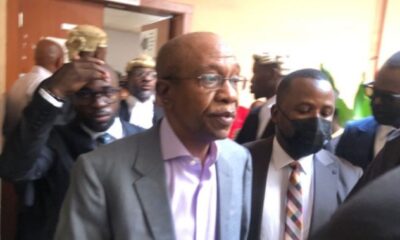Politics
Resign Right Away- Amefiele and Malami
Published
1 year agoon

Resign right away. Amefiele and Malami
- CBN has kept mum over the judgment
- Femi Gbajabiamila, applauded the ruling of the apex court
- Supreme Court ordered the CBN to allow both the old and new naira notes
The ruling All Progressives Congress (APC) has called on the Central Bank of Nigeria (CBN) Governor, Mr. Godwin Emefiele, and the Attorney General of the Federation (AGF), Mr. Abubakar Malami, to leave their positions due to their ignoble role in the case following the Supreme Court’s decision yesterday directing that the old naira notes must remain in circulation until December 31, 2023.
This was as the Speaker of the House of Representatives, Femi Gbajabiamila, applauded the ruling of the apex court, saying it validated the position of the lawmakers that the implementation of the policy went contrary to the law establishing the CBN. NewsReport gathered.
Meanwhile, the CBN has kept mum over the judgment, though there were indications last night in Abuja that it may have set up a team to study the ruling.
A source familiar with the matter, however, said that Emefiele would reach the President on the next plane of action.
“There is no indication that the CBN will react to the judgment until there are pronouncements from one of the spokespersons for the president or from the office of the AGF,” the source revealed.
Many financial experts, who spoke with The Guardian on the development, also expressed satisfaction with the ruling, saying complying with it would ease the sufferings of the banking public and boost the economy. However, some expressed fears that the CBN may not recirculate the old notes, hence the sufferings of Nigerians would linger a bit more.
In its ruling, the Supreme Court ordered the CBN to allow both the old and new naira notes to circulate side by side till the end of this year.
It also voids and sets aside all directives issued by President Muhammadu Buhari with respect to the naira redesign and circulation policy on grounds of illegalities and abuse of executive powers.
The court took a swipe at the president for disobeying its interim order of February 8 to the effect that the old naira should be allowed to be in circulation.
Justice Emmanuel Akomaye Agim held that the President exhibited and took the disobedience to the highest peak with his February 16 broadcast, in which he allowed only N200 notes to be re-circulated.
In the judgment, the court held that the President acted ultra vires by his glaring failure to consult with the National Council of States, the Federal Executive Council (FEC), and the National Economic Council (NEC) before directing the CBN to unlawfully introduce the new naira notes.
Justice Agim held that the unconstitutional use of power by President Buhari on the naira re-design policy has breached the fundamental rights of Nigerians in various ways. The apex court said such use of powers by the president is not permitted under democracy or in a plural society like Nigeria.
The Supreme Court, among others, held that the unlawful use of executive powers by the President inflicted unprecedented economic hardship on the citizens by denying them ownership of their money and access to it.
In a unanimous judgment, the Supreme Court also faulted the three-month notice given by the Federal Government as being unlawful and insufficient for the policy. It also held as unconstitutional and unlawful the policy of withdrawal limits introduced by the CBN.
The court went ahead to hold that the Federal Government placed the cart before the horse in its implementation of the policy on the cashless economy.
It said that instead of consulting with the other federating units before the implementation of the cashless policy, it rather implemented it before the commencement of consultation.
On the preliminary objection by the defendants that the Supreme Court has no jurisdiction to hear the matter, the court held that the matter is between the Federal Government and federating units, which gives it jurisdiction.
It could be recalled that 16 states of the federation had instituted the suit to challenge the legality or otherwise of the naira re-design policy and its implementation.
Kaduna, Kogi, and Zamfara states spearheaded the suit, but Katsina, Lagos, Cross River, Ogun, Ekiti, Ondo, Sokoto, Rivers, Kano, Niger, Jigawa, Nasarawa, the Plateau, and Abia states were joined as plaintiffs.
Upon an application by Bayelsa and Edo States, the court, on February 15, joined the two states as co-defendants with the original sole defendant, the Attorney General of the Federation (AGF).
The 16 states had prayed to the Supreme Court to void and set aside the policy on the ground that it was inflicting hardships on innocent Nigerians.
They accused President Buhari of usurping the function of the CBN in the introduction and implementation of the policy, asking that the directive issued by Buhari be voided.
On its part, the Federal Government challenged the jurisdiction of the Supreme Court on the grounds that the CBN was not joined as a party and that the dispute over the policy ought to be directed at the CBN so that the suit could be referred to the Federal High Court.
Reacting to the judgment of the Supreme Court on the matter, APC’s National Vice Chairman North West, Dr. Salihu Lukman, in a statement in Abuja, called on the CBN Governor, Emefiele, and the AGF, Malami, to resign their positions over what he described as their ignoble role in the cash crunch saga.
The party remarked that it was unfortunate that President Buhari was misled into such acts of illegality and abuse of executive powers as pronounced by the Supreme Court.
The party noted: “We, and indeed all Nigerians, are grateful to the Supreme Court Justices led by Justice Akomaye for this landmark judicial intervention.” Given the injurious nature of the consequences of the cashless policy of the Federal Government as it has been implemented thus far and the damage of the Supreme Court ruling to the profile of President Muhammadu Buhari, the Governor of the Central Bank of Nigeria (CBN), Mr. Godwin Emefiele, and Attorney General of the Federation, Mr. Abubakar Malami, must take personal responsibility for this act of illegality by the Federal Government.
“In advanced democracies, public officials who commit such illegal acts voluntarily resign from their positions.”
Therefore, if indeed the cashless policy of the Federal Government was supposedly designed to conform with extant legal provisions of the Nigerian Federation, now that it has turned out in the direct opposite, both the CBN Governor, Mr. Emefiele, and the Attorney General of the Federation, Mr. Malami, should accept the limitations of both their knowledge of the law and commitment to democracy by resigning from their respective offices forthwith.
“Rule of law is fundamental to democracy, and individuals who flagrantly violate the laws or promote acts that breach the constitution of the Federal Republic of Nigeria must not be tolerated,” the party said.
The party called on Nigerians to take note of the fact that the crusade against the Federal Government’s cashless policy was led by the APC, not minding the attempt to sensationalizely politicize it to the benefit of opposition political parties and their candidates in this election season.
It added: “It is gratifying that Nigerians resisted the antics of subversive politicians who wanted to use such crude methods, including inflicting untold hardship and pain on Nigerians, to provoke citizens into voting against the APC during the February 25 presidential and national assembly elections.”
“We commend and salute Nigerians for their faith in our party, the APC, and determination to support our party and our candidates during the 2023 elections. We are indeed confident that Nigerians across all 36 states of the federation will reaffirm this confidence during the governorship and state house of assembly elections on Saturday, March 11, 2023.
“It is a patriotic duty to challenge the policy of the government, which unfortunately plunged Nigerians into hardship and unimaginable shock, notwithstanding partisan affiliations.” By so doing, our leaders in APC, led by Mallam Nasir, Alh. Yahaya Bello, and Alh. Matawalle, have once again demonstrated superior commitment to democracy.
Kaduna State Governor, El-Rufai, who was in court alongside his Kogi and Zamfara state counterparts, described the judgment as a victory for the people.
He explained that they filed the suit because they sensed that the policy was targeted at their party, the APC.
El-Rufai stated that although the president was from the APC, they approached the court to seek redress when efforts to resolve the issue behind closed doors as party men failed.
He urged Nigerians to go ahead with using the old naira notes in line with the Supreme Court’s order.
The Speaker of the House of Representatives, Gbajabiamila, on his part, noted that the apex court has once again proved that it is the highest court of justice in the land.
In a statement yesterday, the speaker said, “It has always been the position of the House of Representatives that, despite the noble intentions behind the currency swap policy, the design and implementation of the policy have been fatally flawed and contradictory to the ends of law and public policy.”
“The decision of the Supreme Court suspending the currency swap policy introduced by the Central Bank of Nigeria (CBN) and extending the implementation deadline to December 31, 2023, validates the position of the House in its entirety.”
Describing the implementation of the policy as “remarkably haphazard,” Gbajabiamila stated that it fell way short of international standards.
“It deviated from the prior practice of the CBN without providing any benefits to the Nigerian people or the economy of Nigeria, both of which have suffered significant harm as a result,” he added.
He said the CBN “must respect the apex court’s judgment and act quickly to give it full effect,” stressing that “this is necessary to reverse some of the damage done to our economy and prevent the continued suffering of the Nigerian people.”
Gbajabiamila commended the governors of Kaduna, Kogi, and Zamfara, as well as their other colleagues, for approaching the apex court to make a decision on the matter, describing their action as “the right thing to do.”
“It showed their collective adherence to the rule of law and their determination to take bold actions that serve the best interests of the Nigerian people.”
“While we anticipate action by the Central Bank, there is still a need to examine and understand how this policy intervention turned out the way it did.”
“The House of Representatives will exercise its authority to review the actions and inactions and the failures of law and procedure that set the conditions for this profound failure of public policy.” “This is necessary to ensure we take the right legislative actions to prevent future reoccurrence,” he noted.
A human rights lawyer and activist, Jiti Ogunye, also applauded the judgment, noting that it aligns with the judicial precedents laid down by the apex court itself.
The lawyer stated that when a matter is submitted to the court for adjudication, even though an order, a restraining order, has not yet been made, parties are expected to act in deference to the court and its proceedings.
“It then becomes worse when a restraining order has been made and any of the parties say the order will not hold. That is what the president did. It was defiant, it was disrespectful, it was shameful,” he said.
He therefore expressed his gladness with the verdict, noting that it further buttressed the fact that the court is always alive to its responsibilities.
“So, I am glad that the Supreme Court has intervened. I am glad that they are doing this regardless of the fact that the President is on his way out of power, so that nobody will make the mistake of being so high or tall. Indeed, the president is a very tall man; the law is taller than him. This is a very beautiful day for democracy because constitutionalism and the rule of law have been entrenched,” he said.
An insurance broker, Bonaventure Ibe, has also advised the Federal Government to obey the judgment for the sake of the economy.
The Director of the Institute of Fiscal Studies (IFS), Godwin Ighedosa, also called on the apex bank to respect the ruling of the court, especially as it concerns the currency swap policy.
“For me, the December 31, 2023, deadline as the last date for the legality of the old notes will help the economy to rebound and the sufferings of the ordinary Nigerian will be reduced,” he said.
A Professor of Capital Markets at the Nasarawa State University, Keffi, Uche Uwaleke, also advised the CBN to comply with the ruling since it has come from the final court in the land.
“Doing so will help revive economic activities and reduce the current difficulties being experienced by Nigerians on account of the policy,” he added.
He, however, noted that it was important to recognize that the CBN has recorded some achievements in terms of the objectives it set out to achieve.
He emphasized that the reduction of the huge amount of cash circulating outside the commercial banks, the surge in electronic transactions, and the increase in financial inclusion were part of the achievements recorded thus far.
“The time frame until December 31, 2023, provides an opportunity for the CBN to reassess the policy and improve on its implementation without causing distortions to the economy,” he noted.
Despite the feeling of relief among Nigerians, an economist and financial expert, Dr. Chiwuike Ubah, said he does not see the Federal Government returning the recovered old naira notes of N1000 and N500 into circulation, saying that the most that could happen with the order of the Supreme Court was to allow those still in possession of the affected naira notes to use them.
Ubah stated that he does not see the development reducing the current pressure on the economy, adding that the order of the Supreme Court may not be implemented until May of this year, when a new government assumes office.
“What the Supreme Court did was to redress the abuse of the law by the CBN. This is because the law says that the old and new notes should run concurrently and that the old notes remain legal tender each time they are returned to the bank. So, CBN’s earlier role was in contravention of that rule. But beyond that, I don’t see the federal government obeying this law. They won’t say they won’t do it, but the CBN will not release the old notes into the system. They will technically keep the old notes and gradually release the new ones. This is because even after the President ordered the release of the old N200 notes into the economy, the CBN still did not flood the banks with the old notes. What they released was very little, but it still put pressure on the people. Even the ones they brought out were old, dirty notes. So I don’t see it happening until May this year, when a new government will assume office,” Ubah said.
A public sector economist, Dr. Desmond Echeta, has also stated that the Supreme Court judgment was indicative that individuals were stronger than institutions in Nigeria.
Echeta, who is a senior lecturer at the University of Agriculture and Environmental Sciences in Umuagwo, Imo State, said, “You know Nigeria doesn’t have institutions. Individuals are stronger than institutions in Nigeria. The fact is that the CBN Act empowers the CBN to deal with monetary policies; the Supreme Court cannot constitute itself into performing functions of the CBN. That is the problem we are having. Remember that the CBN did not join that suit.
“The implication is that individuals will have to carry out their businesses the way they want to carry them out because they don’t have confidence in the system.” They don’t have confidence in the judiciary.
“So, it will also continue to affect the economic activities that are going on. If you give the N1,000 note to anybody, they will not take it. You have to start explaining to them what the Supreme Court said. They’ll ask you who the Supreme Court is. They will tell you that the president appoints whoever is on the Supreme Court.
They will take what the president said. So, that is the situation we are in now. This type of thing happens when institutions fail. What I know is that people will conduct activities the way they want to conduct them without recourse to any law.”
Although many Imo residents who spoke with The Guardian welcomed the judgment, a trader in Owerri, the state capital, Eze Onyeze, said: “We thought this was getting behind us. We are starting over. Vote buying is likely to continue in the next governorship and state assembly elections. This is a license to the politicians who kept large sums of old banknotes in their homes.”
In Plateau State, many residents told The Guardian that the judgment was a relief. They expressed the hope that it would reduce the lines of people wanting to cash money at commercial banks.
However, in Delta State, the Supreme Court judgment seemed not to have changed anything, as frustration and difficulty in accessing old or new records lingered.
At the banks visited on Nnebisi Road, it was the same old story: long queues, no cash, or rationing of the same where available. Indeed, most of the customers had waited endlessly for hours, unsure of when it would be their turn or if there would still be cash by then.
One customer, obviously frustrated, asked: “So, why did the federal government make us go through this hardship? Did the policy stop vote-buying on February 25? If Tinubu was the target, as he alleged, did he still not win? Who is deceiving whom? If Atiku was the target, was his supporter not caught with US dollars in Port Harcourt?
“This government has failed Nigerians on virtually all fronts and should just go away.” “We can’t wait for May 29 to start another journey into the unknown.”
Another customer at another bank branch, who gave her name as simply Amaka, added: “We are being treated like robots in this country. So, why all these sufferings if they knew it would amount to nothing? What have the masses gained from all this abracadabra and deceit?
“They can never deceive us again. We trust no arm of government, whether executive, legislative, or judiciary. They are three fingers of the same leprous hand, and nothing good can come out of their actions based on their recent antecedents.
“I weep for Nigeria, my generation, and generations yet unborn, if we continue on this path.”
You may like
-


Recapitalization: UBA seeks Shareholders’ Approval to Issue 10.8 Billion Shares
-


Emefiele still in EFCC Custody, Court Remands Him till April 11.
-


CBN Board Nominee Declines Tinubu’s Appointment.
-


Uncovering the $26B Crypto Enigma: Nigeria’s Central Bank and Binance
-


Supreme Court Nullifies AMCON’s Seizure of Lagos Hotel
-


CBN Lowers Exchange Rate for Cargo Clearance to N1515.09/$



